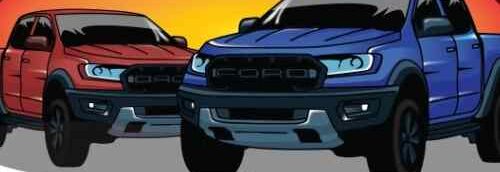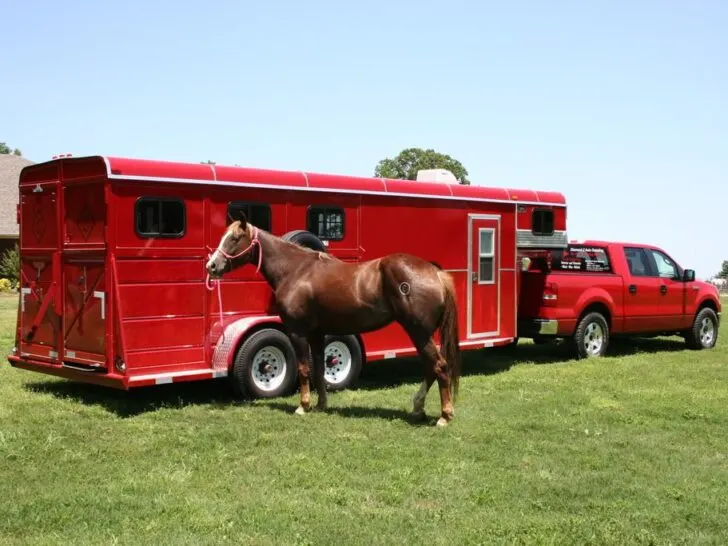Here are the 5 easy steps t tow a horse trailer with your Ford F150. We have also added the required tools and their cost in this detailed guide.
Can a Ford F150 Tow a Horse Trailer? Yes, the Ford F150 can tow a horse trailer because of its sufficient towing capacity. The towing capacity of the Ford F150 ranges between 7500 lbs to 13500 lbs, whereas the average weight of a horse trailer varies between 2500 to 4500 pounds. Although the trailer’s weight depends upon the number and weight of horses, overall it makes up enough weight that a Ford F150 can carry.
Can a Ford F150 Tow a Horse Trailer?
Towing a horse trailer requires the right selection of truck that can easily carry it. Many vehicles can tow single or two-horse trailers, such as the ford f150.
You require many tools for the towing procedure, and you have to gather all of them for proper towing. The things you need for this purpose are your roadside emergency kit and a hitch set. You must have roadside triangles, tow straps, jumper cables, flashlight, duct tape, hooks, ropes, clippers, chains and wire-cables, and pliers.
Precautions and care are the necessities of every step. Avoid harming your vehicle, trailer, and most prominently yourself, and be careful while using all the tools.
The time required for towing
Time is a concern of many owners and towing a trailer requires enough time. You have to make sure that the hitching and attaching are proper to avoid damaging the trailer or the truck. Do not hurry and take sufficient time to match and secure them together.
When you are doing it for the first time, you can take a lot of time for proper attaching and hitching. An experienced person will do it more speedily. It will take some minutes to some hours depending upon your experience and efficiency.
Methods to tow a horse trailer with a Ford F150
Towing a horse trailer with a Ford F150 does not require too much struggle and effort, but it requires careful and efficient working. You should also know the weight of the Ford F150.
You can achieve the goal by correctly matching your truck with the trailer. All you need is to gather the needed-tools and start with wearing the safety gloves. Here are the steps of towing:
Determine the tongue weight of the horse trailer
The tongue weight of the trailer is the weight that your towing vehicle experiences on its back. It usually looks like the back of the truck is pushing down due to the trailer tongue weight. It is an extended part of the trailer that goes above the backside of the towing truck.
If this weight is too much, it can result in a loss of control of your vehicle. Heavy tongue weight can lift the front side of the truck by applying pressure and weight on the backside.
Even if the loaded-trailer weight matches the towing capacity of f150, you can not tow the trailer with f150 in this situation.
Choose the right hitch
Hitching is the process of matching and connecting the trailer with the vehicle. It is necessary to recognize the GTWR of the trailer and the hitch weight-loading capacity. If you put extra load on the hitch, it will fail in the whole towing process.
Hitches usually come with sets depending upon the weight-holding capacity, and you have to choose the appropriate hitch-set.
A tow hitch having a frame-mounted receiver is preferable for a horse trailer. They have a bolted-ball with a steel tube-like ball mount that slides into the receiver. The size of the ball ranges between 2 to 2. 5 inches.
Correct positioning the Ford F150
Position the truck in a way that the rear tires come in front of the trailer. You have to line up the trailer and truck in such a way as to keep the truck’s bumper and the trailer’s center facing each other. Align accordingly so that the ball comes under the coupler as it will help you hitch up easily.
Connection parts of the tow hitch
You have to know the parts of the hitch and their correct attachment before starting.
The receiver of the hitch: It is the part present on the frame of towing vehicle. It is a tube that receives a ball mount.
Ball mount and ball: You have to slide-in the ball mounts into the receiver. You can buy these ball mounts in any shape from the market. It attaches to the ball that is coming from the truck.
The coupler: This connecting part is present on the trailer on which you have to connect the hitch ball.
Safety chains and cables: You must also attach safety chains to the trailer and f150 hitch. There are chances that the balls or chains may disconnect during traveling, so you have to be very careful.
Trailers brake lights and signal operator: You must plug in the wiring harness that contains these brake lights and signals into the rear bumper to operate the trailer’s brakes. You have to install a brake controller on your f150 that will control these trailer’s breaks.
Hitch up and secure the trailer with the truck
Make sure to properly hitch up and secure the connections by properly attaching the coupler and ball along with safety chains and cables. Secure and lock the ball with the coupler to prevent them from disconnecting during the ride.
Sometimes you need to apply pressure to place the ball correctly. Plugin the trailer lights and brakes and make sure to take a trail ride on an open road before traveling on a high traffic road or highway.
Why people tow a horse trailer with a Ford F150?
Horse riding is the hobby of most people, and they enjoy going for summer trail riding at some open places. Horse trailers are necessary to carry horses from one place to another when the distance is too long. Usually, people use their to shift their horse to their vacation spot, far away from their residence.
It is not easy to ride the horse for a long distance, especially when you are up to a hill station or picnic spot. They can not avoid their horse health, so people use trailers to move their horses on long journeys.
Horse trailers can not move by themself need some automobile to tow and carry them along the way. Towing a horse trailer with a suitable and capable vehicle is necessary for the safety of the trailer, towing-vehicle, horse, and the people.
Can towing a horse trailer damage your Ford F150?
Yes, when your F150 is not capable of towing the trailer or when the trailer weight is too much that is out of the towing capacity of your F150, it can result in damage.
It is necessary to determine the towing capacity of the vehicle and trailer weight. When you pull a too heavy and weighted trailer with a Ford truck, it either damage the bumper or can burn off your truck’s brakes.
It happens when you wrongly consider the horse weight. Usually, a horse weighs between 700 to 1000 lbs, but sometimes a regular horse can weigh up to 1400 lbs. You have to measure the weight of the horse trailer accurately.
Cost of towing
When you have your ford f150, roadside kit, and hitch, you do not have to spend too much on the towing process. If you call experts for this purpose, they will cost you more but doing it yourself is not costly.
The emergency kit’s cost ranges between $25 to $40 while a ford f150 costs around $29000. The price of the hitch varies between $20 to $60. When you are calling an expert, you have to pay him also according to his fee.
Related Articles:

